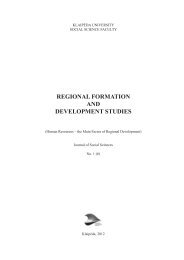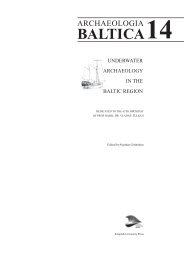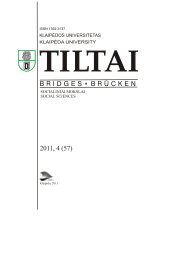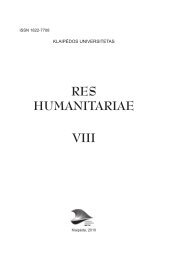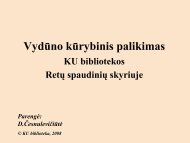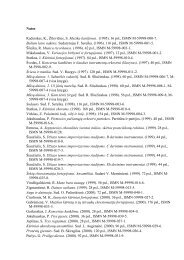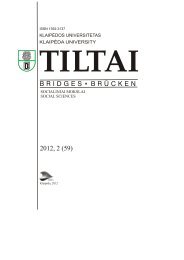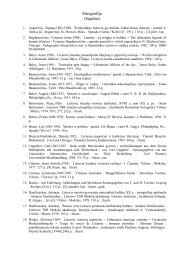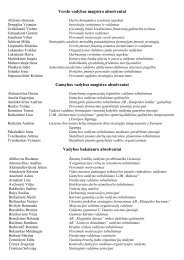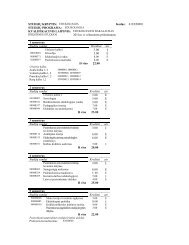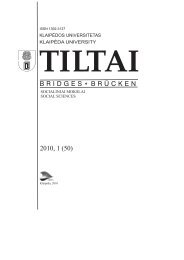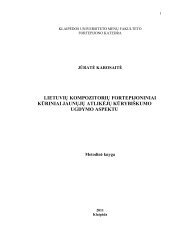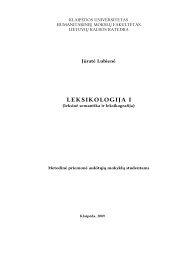Create successful ePaper yourself
Turn your PDF publications into a flip-book with our unique Google optimized e-Paper software.
Hilmar Þór Hilmarsson<br />
(TA) to prepare policy actions and TA to help with implementation. They can target<br />
this TA to policy action they are most keen to support.<br />
It is understandable that small donors like the Baltic States may hesitate to engage<br />
in coordinated budget support operations. This may not only be due to their relatively<br />
small aid budgets but also concerns that their advice will not get proper attention in a<br />
larger donor group. In addition to this comes a possible loss of visibility and identity.<br />
Projects would surely allow them to plant their flag and to better control the use of<br />
their money.<br />
But what has been the experience of some of the small donors so far? In a study<br />
presented at the 12 th EADI General Conference 2008 Laura Leyser considers the case<br />
of two small bilateral donors, namely Austria and Ireland, and their experience of Program-Based<br />
Approaches, PBAs. Leyser finds that “a shift towards PBAs seems even<br />
more important for small bilateral donors than for large ones” (Leyser, 2008, p. 2).<br />
PBAs “enable small donors to “punch above their weight” in terms of influence and to<br />
realize endeavors that would be impossible alone” (Leyser, 2008, p. 34). When discussing<br />
the Irish experience Leyser states that “The most remarkable effect of Iris<br />
PBA engagement has been its lead position in most of the PBAs it participates. PBAs<br />
make Irish Aid “bigger” relative to its share of funding” (Leyser, 2008, p. 3). Leyser<br />
gives further examples about Austria’s experience in Mozambique and Luxembourg’s<br />
working group leadership in Vietnam and concludes that “Accordingly it seems that<br />
small donors tend to become bigger by engaging in PBA’s, while possibly becoming<br />
smaller when remaining outside” (Leyser, 2008, p. 33).<br />
What Leyser’s paper demonstrates is that small donors can have an impact and this<br />
impact can increase if they work in partnership with other donors. Her discussion<br />
about Programme Based Approach is not limited to PRSCs. PRSCs however (and<br />
DPLs more generally) are programmatic to the extent that they include more than one<br />
operation (e.g. PRSC 1 and PRSC 2). 16<br />
According to Martin Rama, 17 Irish support to Vietnam is channeled through two<br />
policy lending operations: one cross-cutting (PRSC) the other sectoral and focused on<br />
poverty reduction among ethnic minorities (Program 135 Phase II). Given the limited<br />
16 Generally, each of the operations is on a single tranche, as there is great reluctance to use<br />
strict conditionality, as would be required in multi-tranche operations. Therefore, it is conceivable<br />
to have a DPL that is not programmatic (just one operation). But that would be the exception<br />
more than the rule, at least in principle. In practice, PRSC and DPL series which were<br />
supposed to be programmatic never move beyond their first operation (e.g. because the macroeconomic<br />
situation deteriorates, or a new government is not keen to follow up). In the Poverty<br />
Reduction Support Credit evaluation of the World bank one can see that countries like Armenia<br />
received 4 PRSCs from 2005 to 2008, Burkina Faso received 7 PRSCs from 2002 to 2008,<br />
Georgia Received 4 PRSO from 2006 to 2008, Moldova received two PRSCs from 2007 to<br />
2009, Mozambique received 5 PRSCs from 2005 to 2008 and Vietnam received 7 PRSCs from<br />
2001 to 2008, etc. For some other countries only one PRSC is reported like for Azerbaijan,<br />
2005, Nepal, 2004, Sri Lanka, 2003, etc. (World Bank, 2010b). The PRSCs including more<br />
than one operation can be considered programmatic.<br />
17 Email from Martin Rama to the author on March 23, 2011. Dr. Rama was the Lead Economist<br />
for the World Bank in Vietnam.<br />
10



